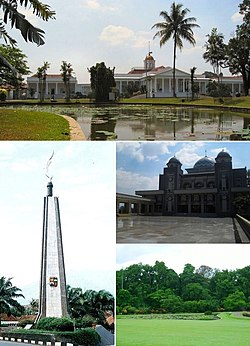Buitenzorg
|
Bogor Pakuan Pajajaran Dayeuh Pakuan Buitenzorg |
||
|---|---|---|
| City | ||
| Other transcription(s) | ||
| • Sundanese | ᮘᮧᮌᮧᮁ | |

|
||
|
||
| Nickname(s): Kota Hujan (City of Rain) | ||
| Motto: Dinu kiwari ngancik nu bihari seja ayeuna sampeureun jaga (Preserving the past, serving the people, and facing the future) |
||
| Location of Bogor in Indonesia | ||
| Coordinates: 6°36′0″S 106°48′0″E / 6.60000°S 106.80000°ECoordinates: 6°36′0″S 106°48′0″E / 6.60000°S 106.80000°E | ||
| Country |
|
|
| Province |
|
|
| Founded | 1482 | |
| Other names | Pakuan Pajajaran (−1746) Buitenzorg (1746–1942) |
|
| Government | ||
| • Mayor | Bima Arya (PAN) | |
| • Vice Mayor | Usmar Hariman | |
| Area | ||
| • Total | 118.5 km2 (45.8 sq mi) | |
| Elevation | 265 m (869 ft) | |
| Population (2014) | ||
| • Total | 1,030,720 | |
| • Density | 8,700/km2 (23,000/sq mi) | |
| Time zone | WIB (UTC+7) | |
| Postal code | 16100 to 16169 | |
| Area code(s) | +62 251 | |
| Vehicle registration | F | |
| Website | kotabogor.go.id | |
Bogor (Sundanese: ᮘᮧᮌᮧᮁ, Indonesian: Kota Bogor, Dutch: Buitenzorg, Chinese: 茂物; pinyin: Mào wù) is a city in the West Java province, Indonesia. Located around 60 kilometers (37 mi) south from the national capital of Jakarta, Bogor is the 6th largest city of Jabodetabek (Jakarta metropolitan region) and the 14th nationwide. Bogor is an important economic, scientific, cultural and tourist center, as well as a mountain resort.
In the Middle Ages, the city was the capital of Sunda Kingdom (Indonesian: Kerajaan Sunda) and was called Pakuan Pajajaran. During the Dutch colonial era, it was named Buitenzorg (meaning "Without a care" in Dutch) and served as the summer residence of the Governor-General of Dutch East Indies.
With several hundred thousand people living on an area of about 20 km2 (7.7 sq mi), the central part of Bogor is one of the world's most densely populated areas. The city has a presidential palace and a botanical garden (Indonesian: Kebun Raya Bogor) – one of the oldest and largest in the world. It bears the nickname "the Rain City" (Kota Hujan), because of frequent rain showers. It nearly always rains even during the dry season.
...
Wikipedia


